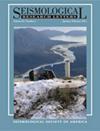High-Resolution Shallow Structure along the Anninghe Fault Zone, Sichuan, China, Constrained by Active Source Tomography
IF 3.2
3区 地球科学
Q2 GEOCHEMISTRY & GEOPHYSICS
引用次数: 0
Abstract
Abstract The Anninghe fault (ANHF), located in southwest China, was a major block boundary that hosted M 7.5 earthquakes historically. For seismic hazard assessment, it is critical to investigate fault properties before future earthquakes. To investigate the fault structure, we deployed three linear dense arrays with an aperture of ∼8–9 km across different segments of the ANHF from October 2019 to March 2020. More importantly, we detonated a new methane source to generate seismic waves, which is environmentally friendly and can be used in different regions such as mountainous and urban areas. After data acquisition, we first removed the noise to accurately pick up the first arrivals of seismic waves. Then, we conducted the first-arrival seismic tomography, a method commonly used in the petroleum industry, to obtain the high-resolution P-wave velocity structure. The tomographic results showed distinct low-velocity zones (LVZs) of ∼1000–1500 m in width and ∼300–400 m in depth along the fault, well consistent with the lateral distribution of site amplification that was derived from regional earthquake waveforms. These LVZs may have formed as a combined result of the fault damage zone and ANHF-controlled sediments. As the Anning River Valley is densely populated, our newly identified LVZs shed lights on earthquake hazard in the region. In addition, we demonstrate that using a combination of methane detonation sources, linear dense arrays, and active source tomography can effectively determine the shallow P-wave velocity model in complex environments (i.e., mountains and urban areas).四川安宁河断裂带高分辨率浅层构造——基于有源层析成像的约束
安宁河断裂带位于中国西南部,是历史上发生过7.5级地震的主要断块边界。对于地震危险性评估,在未来地震发生前研究断层的性质是至关重要的。为了研究断层结构,我们从2019年10月至2020年3月在ANHF的不同段部署了三个线性密集阵列,孔径为8-9公里。更重要的是,我们引爆了一种新的甲烷源来产生地震波,这是环保的,可以在山区和城市等不同地区使用。数据采集完成后,首先去除噪声,准确拾取第一波到达的地震波。然后,采用石油工业常用的一到地震层析成像方法,获得高分辨率纵波速度结构。层析成像结果显示沿断层有明显的低速带(LVZs),宽~ 1000 ~ 1500 m,深~ 300 ~ 400 m,与区域地震波形得到的现场放大的横向分布很好地一致。这些lvz可能是断层破坏带和anhf控制的沉积物共同作用的结果。由于安宁河流域人口密集,我们新确定的lvz为该地区的地震危险提供了线索。此外,我们证明了使用甲烷爆震源、线性密集阵列和有源层析成像的组合可以有效地确定复杂环境(即山区和城市地区)的浅层纵波速度模型。
本文章由计算机程序翻译,如有差异,请以英文原文为准。
求助全文
约1分钟内获得全文
求助全文
来源期刊

Seismological Research Letters
地学-地球化学与地球物理
CiteScore
6.60
自引率
12.10%
发文量
239
审稿时长
3 months
期刊介绍:
Information not localized
 求助内容:
求助内容: 应助结果提醒方式:
应助结果提醒方式:


